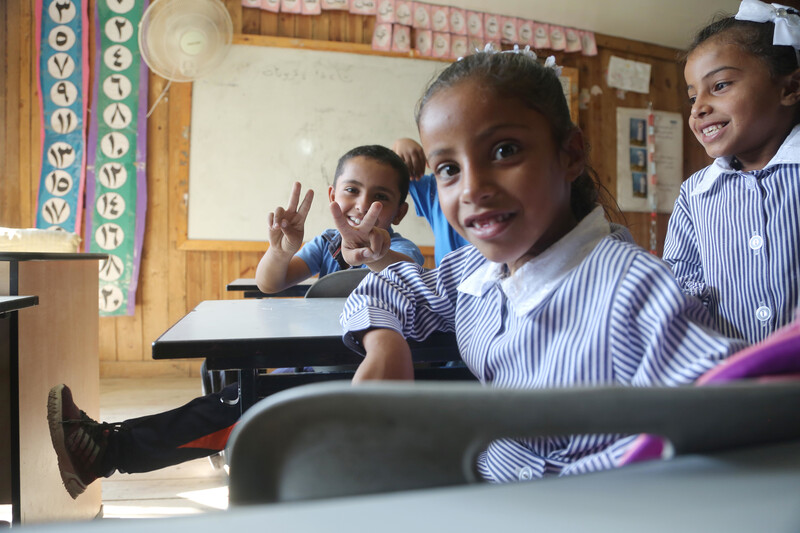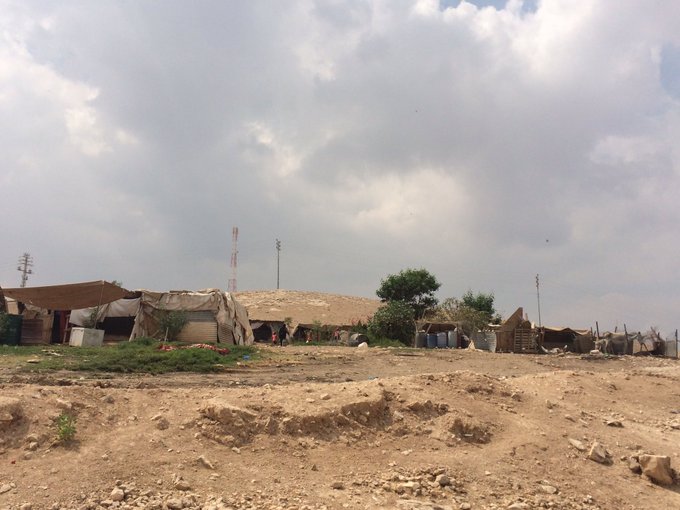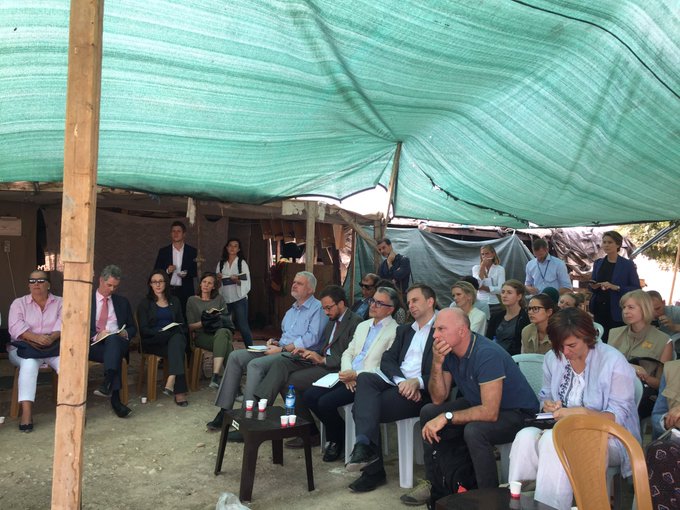Israel planning war crime against Khan al-Ahmar families
 Thursday, September 28, 2017 at 02:14PM
Thursday, September 28, 2017 at 02:14PM by Tamara Nassar 26 September 2017

Children on the first day of school in the occupied West Bank village of Khan al-Ahmar, 23 August 2017. Israel plans to demolish the entire Bedouin community, including the school. Shadi HatemAPA images
Israel’s planned expulsion of the residents of Khan al-Ahmar and the destruction of their village in the occupied West Bank is a war crime, human rights groups are warning.
Earlier this month, Israeli occupation authorities informed members of the community that they would be relocated to a new site, even though legal proceedings are ongoing in Israeli courts.
This has raised fears among UN officials that the expulsion may happen any day.
B’Tselem warned Prime Minister Benjamin Netanyahu and other Israeli officials that they would be personally liable for war crimes if they go ahead with the demolition of Khan al-Ahmar and Susiya, a second village, to make way for Israeli settlements.
“The demolition of entire communities in the occupied territories is virtually unprecedented since 1967,” the Israeli human rights group added.
Expanding settlements
Khan al-Ahmar is located between the Israeli settlements of Maaleh Adumim andKfar Adumim in the so-called E1 area of the occupied West Bank.
This land east of Jerusalem is where Israel plans to expand its mega-settlement of Maaleh Adumim, completing the isolation of the northern and southern parts of the West Bank from each other.
All of Israel’s settlements in the occupied West Bank are illegal under international law.
Khan al-Ahmar is home to members of the Jahalin tribe, including 32 Bedouin families, numbering approximately 173 people.
It is one of 12 Palestinian communities, with a total of about 1,400 residents, in the area east of Jerusalem which face Israeli expulsion.
Palestinian residents of Khan al-Ahmar have previously petitioned the Israeli high court to halt demolition orders targeting all of the village’s structures.
The high court has also received petitions from the settlement of Kfar Adumim demanding that the only school in Khan al-Ahmar be demolished, along with more than 250 other Palestinian structures in the area.
Israeli authorities have also asked for the high court’s blessing to complete the forcible transfer by April 2018.
The court canceled a hearing that had been set for Monday to discuss the case, pending further filings.
Forcible transfer
Israel wants to force Khan al-Ahmar’s residents to move to an area called “al-Jabal West,” located near the landfill of the Palestinian village of Abu Dis. This is an area to which Israel previously forcibly relocated Jahalin families in the 1990s to make way for Maaleh Adumim.
If the planned expulsion proceeds, this would be the second time the community of Khan al-Ahmar is forcibly displaced. The families were initially expelled from theNaqab region by the Israeli military in the 1950s.
This week, B’Tselem said that if Israel demolishes Khan al-Ahmar’s school or forces residents out, including by making their conditions unlivable, “this would violate the prohibition on forcible transfer set in international humanitarian law.”
B’Tselem added: “Such a violation constitutes a war crime, and all persons involved in its implementation would bear personal liability – including the prime minister, senior cabinet members, the chief of staff and the head of the Civil Administration” – Israel’s occupation bureaucracy.
Israel has tried to divert attention from the forcible transfer by claiming that relocation will benefit Khan al-Ahmar’s residents.
But human rights groups, including Israel’s Bimkom, stress that forcible transfer is prohibited regardless of the motive. It would also harm the rural lifestyle and livelihood of the already impoverished communities.
The villagers rely on grazing land and proximity to other Bedouin tribes for their lifestyle.
Israel has previously tried to relocate the families onto land confiscated from other Palestinian communities, a proposal that was rejected by all those who would have been affected.
Constant harassment
Khan al-Ahmar and Susiya, a village in the South Hebron Hills area of the West Bank, are both in Area C.
This is the approximately 60 percent of the West Bank that remains under complete Israeli military rule under the terms of the Oslo accords signed between Israel and the Palestine Liberation Organization in the early 1990s.
Israel refuses to permit virtually any Palestinian construction in Area C, forcing Palestinians to build without permits and to live in constant fear that their homes will be demolished.
Khan al-Ahmar’s school was built in 2009 out of rubber tires and mud in an attempt to evade Israel’s restriction on Palestinians using cement for construction.
But Israel found another excuse to order the school’s demolition, claiming it was too close to the main road.
The school was built with funding from the European Union and other European donors who have done nothing to hold Israel accountable for the destruction of tens of millions of dollars of projects they have supported.
Last month, Israel destroyed two European-funded schools in the West Bank.
“Here to stay forever”
In addition to demolition, Israel tries to force Palestinians out of their homes by making living conditions unbearable.
Israel has dismantled and confiscated solar panels from Khan al-Ahmar, barred direct access between the village and the main road and deprived it of basic services such as water, sewage, electricity and access to transport.
Israel’s renewed commitment to demolish Khan al-Ahmar comes only weeks after Netanyahu participated in a celebration of 50 years of Israeli settlement in the northern West Bank.
“We are here to stay forever,” Netanyahu told the crowd. “There will be no more uprooting of settlements in the land of Israel.”
Israeli media reported this week that Israel’s government is pushing forward plans for an additional 2,000 settler housing units in the occupied West Bank.
***************************************************************
https://www.haaretz.com/opinion/.premium-1.810793
Europeans, your denunciations are seen by Israel as lacking urgency. You must implement painful sanctions
Amira Hass Sep 06, 2017 Haaretz
Palestinian solar panels confiscated by Israel in West Bank village of Jubbet Adh-Dhib, June 2017. Comet-ME
Holland, Belgium and France: It’s not enough to condemn with just words the Israeli policy of destruction, which damages equipment and buildings funded with your taxpayers’ money. It’s good that you are angry, but the pace of the accumulation of your anger lags far behind the galloping and dangerous pace of the bulldozers of the Civil Administration in the West Bank and the Settlements Defense Forces.
The condemnations are seen as lacking urgency. You must take real actions. Yes, open and declared sanctions that have a path to becoming more severe. Painful sanctions. This may be the last chance to remove the average Israeli, including business people, tourists, judges, scholars, farmers and foreign soccer consumers from their indifference and criminal complacency.
Stop being afraid of Israeli emotional blackmail. Israel trades in the memory of our families murdered in Europe in order to speed up the expulsion of the Palestinians from the bulk of West Bank territory to the enclaves of the Palestinian Authority. This is the intention behind all the demolitions and confiscations and bans on construction, herding and field irrigation. Whoever plans and implements this small, gradual expulsion is already thinking about the big expulsion, to Jordan. And what will you do then? Issue condemnations and send water tankers and tents to those expelled?
On August 24, Belgian Foreign Minister Didier Reynders and Deputy Prime Minister and Development Cooperation Minister Alexander De Croo published an official condemnation of the confiscation of the trailers to be used for 1st through 4th grades in the Palestinian village of Jubbet Adh-Dhib, and the confiscation of solar panels for the school at the Bedouin encampment of Abu Nuwwar.
The Belgians noted they were among those who had funded that equipment. “[Belgium] will continue to work together with its partners, as in the past, to ask the Israeli authorities to end these demolitions,” says the Foreign Ministry statement.
One of the partners is The Netherlands, whose parliament has devoted time to discussing the Israeli demolition, more time than the Knesset has. Here is what Dutch cabinet ministers reported to Dutch members of parliament last month concerning the confiscation of the solar panels in Jubbet Adh-Dhib in June: Prime Minister Benjamin Netanyahu promised in a letter to return the solar panels to Holland. (The Prime Minister’s Office spokesman neither confirmed nor denied the report.)
After the confiscation, the village was sentenced to only two hours of electricity a day, produced by a generator. In the last 20 years the village has submitted at least four requests to the Civil Administration to be connected to the electrical network, and all were turned down. Experience teaches that Israel does not, or hardly ever does, give permits for construction in Area C (which covers some 60 percent of the West Bank). The Dutch attempt to receive a permit from the Civil Administration for one project, a test case, did not lead to positive results. As an occupying force, Israel is forbidden to destroy and confiscate property except as a wartime necessity.
France, too, announced proudly that it was a partner in the humanitarian construction in Area C and Abu Nuwwar. France, too, condemned the latest demolitions and asked for the confiscated equipment to be returned. In six months Israel has demolished 259 Palestinian structures in the West Bank and East Jerusalem, states the French condemnation. During the same period, the Israeli government approved the construction of over 10,000 housing units in the settlements – three times more than in all of last year.
So the destruction in Palestinian communities, the evacuation of the Shamasneh family from their home in Jerusalem and Defense Minister Avigdor Lieberman’s plans to demolish Sussia and Khan al-Akhmar are the other side of the coin of settlement construction.
This is how Israel carries out a gradual expulsion. Without sanctions, it can take a deep breath and its faith in its ability to implement the plan is solid. Who knows better than you, and especially your neighbor Germany, where plans for limited expulsion lead to, and what criminal mindset they construct in the society that plans it?
***************************************************************************
 APJP |
APJP |  Post a Comment |
Post a Comment | 


